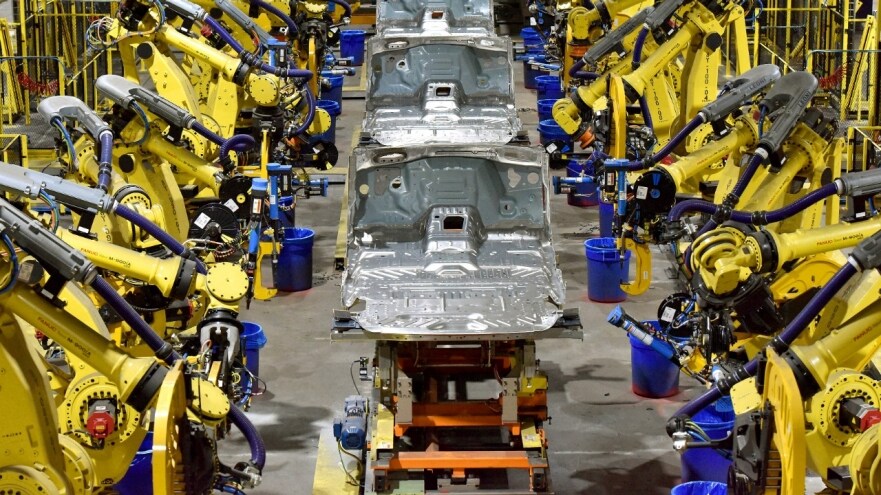


 |
 |
 |
|
#91
|
|||
|
|||
|
|
|
#92
|
|||
|
|||
|
France said they would go to war before they would remove their tariffs. And We might go to war before we remove the 25% tariff on pick-up trucks. Adding tariffs will bring out some spitt’n and bitching, but it’s going to start a war.
Almost no day goes by that someone doesn’t say, we should have universal heath are like all other industrialized nations. Well, why can’t we have the same tariff structure as these nations? Right now, our structure is among the lowest of all. If adding tariffs merely pushes industry to move manufacturing to other third world countries, that is fine. Isn’t that what we all would like to see, these poorer nations become more industrialized with a self sustaining economy? Some manufacturing will move back here, though probably just some specialty operations. |
|
#93
|
|||
|
|||
|
Quote:
The second leg down into 2008, was the housing bubble which was already falling in Sept 2005. It just did not manifest itself in financial markets until 2008. Loss of housing starts led to all sorts of manufacturing declines, and since housing construction really is local, lead to more job losses. I think most large declines are usually linked to a recession. Long term slow declines or lack of growth is more a secular/trade effect. Another interesting data point is amount spent on stock buybacks was larger than CAPEX in the first half of 2018 according to Goldman. Last edited by verticaldoug; 09-19-2018 at 09:57 AM. |
|
#94
|
||||
|
||||
|
Countries that aren't doing business together have less reason to cooperate. His point is exactly right. Who needs to conquer territory that you can lease and put a shopping center with a Mcdonalds on?
Why fight over resources you can earn in the market? Last edited by Aaron O; 09-19-2018 at 10:01 AM. |
|
#95
|
||||
|
||||
|
The EU was formed to keep former adversaries from fighting. It has been pretty successful at keeping them from warring and has made Europe more prosperous.
|
|
#96
|
||||
|
||||
|
It's hard to understand shouting about America not manufacturing textiles or steel, because that's just not true. Polartec is an American textile producer, best in the world, in fact. Nucor steel, right here Down South, is an American steel producer, best in the world, in fact.
If capital investors wanted it, we could do it all tomorrow. But capital investors want more profits, and labor costs are the #1 expenditure in commerce. Internationally capitalized multi-national companies, like Ford or Carrier, aren't particularly American. Sure F-150 are assembled down here, but not one part is manufactured here. In Carrier's case the assembly is done in Mexico under NAFTA definitions that allow using 'made in the USA' labelling, but the company is actually Japanese. Take mattresses for example; there used to be at least 30 American mattress manufacturers, recently. Today there are 2-3, but they are capitalized not to increase manufacturing, but to reduce it. The capital investors then raise prices and reduce labor costs AND introduce structured consumer debt - financing - into the market to create greater profits. It's really evident that the fastest growth is in sectors selling debt. For example GM financing, Ford financing, Volkswagen financing are all larger and more profitable than the companies they service. Or healthcare, where preventable diseases are the baseline for the hospital architecture, which is driven by the debt hospital corps can take on. So a trillion dollar industry making built environments for physicians to work in is rewarding only physicians that treat lifestyle driven diseases, and accomplishing it all based on leveraged 'growth'. Education costs, housing costs, construction etc. all trend tightly along these lines. It's not a problem of Americans can't. Americans DEFINITELY CAN. But we aren't, and there are reasons why we don't. |
|
#97
|
|||
|
|||
|
I'm well aware of the role trade has played in world history and warfare but question that sweeping generation. If you look at our country's recent history, we seem to find ourselves becoming involved in other countries civil wars. Afghanistan, Syria, The Balkins, Vietnam, Korea. Correct me if I'm wrong but it appears that ideological, ethnic, and religious tension seem to be the cause of most of the world's hot conflicts since the end of the second world war... Isreal vs the Arab nations, Pakistan vs India, Iran vs Iraq, Burma, etc. As to the EU, Western Europe learned from the second world war, the only fighting they were interested in was that which would preserve their colonies and they didn't do too well there.
|
|
#98
|
|||
|
|||
|
Is that the same Polartec that has gone through 2 bankruptcies, and just announced that they will move all their manufacturing from Massachusetts to Tennessee due to the high cost of union labor, and the ability to cross-train workers on different machines (which the Massachusetts union laborers won't do)?
|
|
#99
|
|||
|
|||
|
Quote:
While one can argue it was inevitable, the US being pulled into World War II was a direct result of our oil embargo on the Japanese Empire. Ye Gods, this country exists because of bad economic policy under King George III, and some dudes here were tired of it. Barriers to trade, commerce and by extension open lines of communication inflame tension, heighten the possibility for misinterpretation of action, and open windows to the kind of nationalist jingoism that drags people to war. The Bretton Woods conference conclusion about World War II was right. Protectionism made things worse, not better, on the international stage during the Great Depression of the 1930s, and set the world on a path toward violence. I'm not arguing no tariffs. There are good policy reasons for them. But as a whole, they should be used exceedingly sparingly, in my view. They have a whole host of knock-on effects that we can't always predict. |
|
#100
|
|||
|
|||
|
Quote:
And we have to actually make something. All this airy fairy talk about the service economy is just a pure lie. We might all be service workers but at some point someone has to actually make something. Someone has to raise the cattle and someone has to build the machines to make cattle into hamburger and some others need to build the machines to transport it or no Big Macs for you. We GOTTA have a competent and capable infrastructure of business and industry. Outsourcing everything is not gonna work. Within our borders government should stay out of picking the winners and losers. But when it comes to regulating how our country does business with the rest of the world it is a primary function of our government to do so in a manner that creates an environment that fosters success by Americans. This is one of the reasons we have a federal government. Its their job. Last edited by HenryA; 09-19-2018 at 12:25 PM. |
|
#101
|
|||
|
|||
|
Quote:
Costs go up. Prices go up OR companies find alternative ways to keep profitable. Those alternate ways include off-shoring, automating, etc M |
|
#102
|
||||
|
||||
|
"Within our borders government should stay out of picking the winners and losers. But when it comes to regulating how our country does business with the rest of the world it is a primary function of our government to do so in a manner that creates an environment that fosters success by Americans. This is one of the reasons we have a federal government. Its their job."
a rather optimistic statement. How can this be accomplished when congress is funded primarily by special interest? Congressmen do what their donors tell them to do. Tax break for the 1%, increase national debt by a trillion or so. Add 700 million to the military budget but you can't fund Medicare, welfare, social security and public education. Sorry the skepticism, wars in the middle east were for profit, ideology has nothing to do with it.
__________________
Cuando era joven |
|
#103
|
|||
|
|||
|
Quote:
https://www.stlouisfed.org/on-the-ec...ally-declining Here's the Jeep manufacturing line in Toledo during WWII:  Here's the Ford assembly line in Louisville from February:  You tell me what looks different. |
|
#104
|
||||
|
||||
|
uuummmm....theyre building better quality cars in the first pic ???
|
|
#105
|
||||
|
||||
|
Quote:
Automobiles are better today than they've ever been and that trend continues. |
 |
|
|